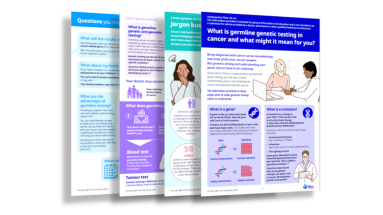Genetic testing and how inherited mutations are found
What is genetic testing?
Genetic testing is a way to look for differences in your genes that increase your risk of getting a certain disease or cancer.1 Your GP might suggest a referral to clinical genetics for a further assessment on whether there is a chance that an inherited disease runs in your family. Whether you have the test or not is your choice. You can ask as many questions as you need, and take time to think it all through, so you can make the best choice for you.
If you have a positive result on a genetic test for cancer it means you have a mutation in that gene. This means you have a higher risk of getting cancer. It does not mean you will definitely get cancer, just that you have a higher risk. The level of this risk depends on the type of mutation you have. 1-4
If you have any questions, speak to your GP or Genetic Counsellor who will be able to give you more guidance.
What are the types of genetic testing and what do they involve?
There are two types, or stages, of testing:
- Diagnostic testing: This type of testing is not done on you, it is done on your family member who has cancer, or who has had cancer. It is to see if they have a gene which could have put them at higher risk of getting cancer.1,5
- Predictive testing: If your family member did have a mutation in their gene, you can be tested for the same gene.1,5,6 If you have it, it means you are at a higher risk of getting cancer, but it does not mean you have cancer, or that you will definitely go on to get cancer.
It is important to remember you are unlikely to be referred for a test unless you have a family member with cancer and a positive diagnostic test for a mutated gene. However, if your family member with cancer is no longer alive there may be other options, so you should speak to your GP about this.1
Testing involves taking a small sample of your blood or saliva. The sample is sent to a laboratory to be tested for genetic mutations.5
It can take a number of weeks for the results to come back.1 This can feel like a long time and the wait can cause you to worry and over think. Before having a test, you should think about who you can go to for support during this time. Could chatting to a friend or family member help you feel better while you’re waiting for your results?
Why might I consider getting a genetic test?
There are two main reasons why you might think about getting a genetic test:4
- If many of your family members have had cancer and you think a high risk gene might run in your family
- If one of your family members has a high risk gene and you want to know if you also have the same inherited gene
‘We didn’t have any history of cancer in our family but my Dad tested positive… it was really terrifying…but I felt that knowledge is power.’
Charlie was faced with making a decision about genetic testing when she was 20. You can hear her story here.
Deciding whether to get a genetic test is a big decision. It is okay to find this decision very hard. It is your choice but talking to your family, friends and Genetic Counsellor may help you make the best choice for you.4,5
How do I know if I am eligible for genetic testing?
The first step to finding out if you are eligible for genetic testing is to find out about the history of cancer in your family. The best way to do this is to talk to your family, and the person with cancer. You will need to know about your family members who have had, or have cancer: 4,7
- What type of cancer did they have?
- What age were they when they had cancer?
- How are they related to you and each other?
Once you have this information, you can decide the best way forward as a family. One possibility is for a family member with cancer to speak to their GP. They are more likely than someone without cancer to be offered genetic testing and so this is often the fastest way to find out if cancer may run in your family. If this is not possible, you can talk to your GP yourself. If they think there is a chance cancer may run in your family, they will arrange for you to see a Genetic Counsellor.4,8
It is important to remember you are unlikely to be referred for a test unless you have a family member with cancer and a positive diagnostic test for a mutated gene. However,
if your family member with cancer is no longer alive there may be other options, so you should speak to your GP about this.
Remember, if you are offered a genetic test it is up to you whether you decide to go ahead with the test or not.12 You should talk it through with your Genetic Counsellor so you can make the best choice for you.
It is also possible to get a genetic test privately. You will have to pay to have a private test and not all private test results will be accepted by the NHS. So it’s good to do your research and make sure you fully understand the process and what will be included.12
What are the advantages and disadvantages of getting a genetic test?
There is a lot to think about when deciding if you should get a test. It can be helpful to think about the possible upsides and downsides, to help you decide.6,10-12
The potential upsides:
- You might find knowing your result (if it is good or bad) is less of a worry than not knowing
- If you know you are at a higher risk of getting cancer, you could have check-ups to look for the early signs. Having regular checks can identify signs of cancer earlier and, if there are any signs, it means you can start treatments earlier, which might reduce the risk of it developing further
- It should put your mind at rest if you find out you don’t have a higher risk of getting cancer
The potential downsides:
- If you know you are at a higher risk of getting cancer you may find it hard to stop thinking and worrying about it
- The result of your test may be unclear or inconclusive, so you may not get an answer and this can be hard to cope with
Take your time when making your choice. There is a lot to take in and it is normal to worry and feel overwhelmed. Talking to your family, friends and Genetic Counsellor will help you make the best choice for you.
If you have any questions, speak to your GP or genetic counsellor who will be able to give you more guidance. There are also plenty more useful resources on this site to help you navigate genetic testing and what it means for you and your family.
References
- Macmillan Cancer Support. Genetic testing for cancer. Available at: https://www.macmillan.org.uk/cancer-information-and-support/worried-about-cancer/causes-and-risk-factors/genetic-testing. Accessed: November 2023.
- Cancer Research. Family history and inherited cancers. Available at: https://www.cancerresearchuk.org/about-cancer/causes-of-cancer/inherited-cancer-genes-and-increased-cancer-risk/family-history-and-inherited-cancer-genes. Accessed: November 2023.
- NHS. Predictive genetic tests for cancer risk genes. Available at: https://www.nhs.uk/conditions/predictive-genetic-tests-cancer/. Accessed: November 2023.
- Cancer Research. Genetic testing for cancer risk. Available at: https://www.cancerresearchuk.org/about-cancer/causes-of-cancer/inherited-cancer-genes-and-increased-cancer-risk/genetic-testing-for-cancer-risk. Accessed: November 2023.
- National Cancer Institute. Genetic testing for inherited cancer susceptibility syndromes. Available at: https://www.cancer.gov/about-cancer/causes-prevention/genetics/genetic-testing-fact-sheet. Accessed: November 2023.
- Evans J et al. The Complexities of Predictive Genetic Testing, BMJ 2001; 322: 1052-6: doi: 10.1136/bmj.322.7293.1052
- Macmillan Cancer Support. Genetic counselling? Available at: https://www.macmillan.org.uk/cancer-information-and-support/worried-about-cancer/causes-and-risk-factors/what-is-genetic-counselling. Accessed: November 2023.
- NICE. Familial breast cancer (breast cancer in the family). June 2013. Available at: https://www.nice.org.uk/guidance/cg164/resources/familial-breast-cancer-breast-cancer-in-the-family-pdf-246406340293. Accessed: November 2023.










